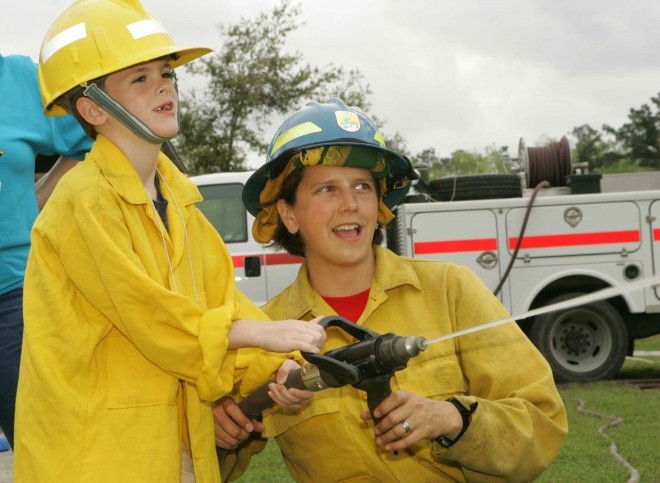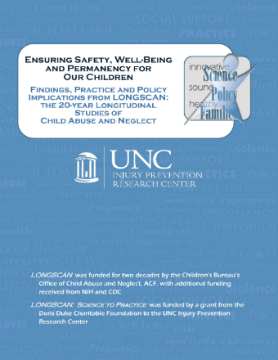Doris Duke Charitable Foundation
Twenty
years ago, LONGSCAN, supported with grants from the Children’s Bureau,
was launched at five sites across the country. LONGSCAN continued to
interview children, their caretakers and their teachers for two
decades, following the children from early childhood into young
adulthood. The data from these interviews has been used in over one
hundred presentations, and over 120 peer reviewed publications, and
continues to be used in new analyses.
 The Doris Duke Charitable Foundation,
the Children’s Bureau, and the LONGSCAN Investigators recognized the
need for the many research findings from LONGSCAN to reach a broader
audience than the scientific community - including professionals who
work to help families and children, policy makers who make budget
decisions or pass laws affecting families and children, advocates for
children and families, and communities and parents throughout the
United States. The Doris Duke Charitable Foundation met this need by funding From Science to Practice. The Doris Duke Charitable Foundation,
the Children’s Bureau, and the LONGSCAN Investigators recognized the
need for the many research findings from LONGSCAN to reach a broader
audience than the scientific community - including professionals who
work to help families and children, policy makers who make budget
decisions or pass laws affecting families and children, advocates for
children and families, and communities and parents throughout the
United States. The Doris Duke Charitable Foundation met this need by funding From Science to Practice.
From Science to Practice
provides each LONGSCAN site with support to convene a meeting to
discuss its most important findings with a broad range of key
stakeholders, who may include representatives from Public Health,
Health and Human Services and DSS in particular, the legal system,
mental health, child advocacy organizations such as Prevent Child
Abuse, and adults who were either in theLONGSCAN study as children or
were involved with child protective services as children. Each group
will develop a set of policy and practice recommendations based on the
LONGSCAN findings discussed. These findings will be disseminated
regionally, and will be synthesized for use at a sixth meeting to be
convened in Washington DC in 2013.
Put succinctly, the purpose of From Science to Practice is to assure that the results of LONGSCAN are widely disseminated, understandable, and of real use
to the people and systems working to help families and children live
safer, happier and healthier lives. For more information, contact Elizabeth Dawes Knight.
Latest DDCF Grant News
LONGSCAN
findings, practice and policy implications for child safety, permanency
and well-being, developed with the input of key stakeholders at six
meetings held throughout the US. Click here to view findings.
 In Other News: In Other News:
On May 3, 2013, Investigators from the LONGSCAN project presented a congressional briefing co-sponsored by Senators Burr and Alexander to HELP (Health, Education, Labor and Pensions) committee staffers.
The briefing included select LONGSCAN findings and related general
practice and policy recommendations generated at the six regional
stakeholder meetings (see links to handouts below).
NC Press Release - Researchers from The
University of North Carolina at Chapel Hill reported recently on the
most significant findings from a twenty-five year study on families and
children. The Family Child Study was initiated in North Carolina with
the primary goal of improving the quality of policy and practice in
order to promote child and family well-being based on sound evidence
from the study. Read more...
|

 The
goal of LONGSCAN is to follow the children and their families until the
children themselves become young adults. Comprehensive assessments of
children, their parents, and their teachers are scheduled to occur at
child ages 4, 6, 8, 12, 14, 16, and 18. Maltreatment data is collected
from multiple sources, including record reviews, at least every two
years. Yearly telephone interviews allow the sites to track families
and assess yearly service utilization and life events.
The
goal of LONGSCAN is to follow the children and their families until the
children themselves become young adults. Comprehensive assessments of
children, their parents, and their teachers are scheduled to occur at
child ages 4, 6, 8, 12, 14, 16, and 18. Maltreatment data is collected
from multiple sources, including record reviews, at least every two
years. Yearly telephone interviews allow the sites to track families
and assess yearly service utilization and life events.  The
The